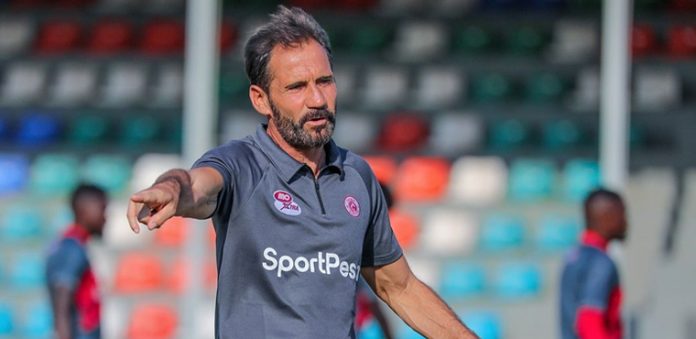In a surprising turn of events, Didier Gomes da Rosa, the highly respected French coach of Botswana’s national football team, has announced his resignation.
His departure comes just days after leading the Zebras to two impressive victories over Cape Verde in the Africa Cup of Nations (AFCON) qualifiers.
While Botswana’s hopes of qualifying for the 2025 AFCON in Morocco remain high, the sudden exit of Gomes da Rosa has sent shockwaves through the country’s football community.
Gomes da Rosa, who has now taken up a role with Libyan giants Al Ahli, cited a breakdown in his working relationship with the newly elected Botswana Football Association (BFA) president, Tariq Babitseng, as the primary reason for his resignation.
The coach’s frustration with the new football leadership paints a picture of a football system in turmoil, despite the national team’s recent successes.
A Successful Start Tarnished by Leadership Conflicts
Didier Gomes da Rosa, aged 55, has enjoyed a successful tenure with the Botswana national team since his appointment.
Under his guidance, the Zebras recorded impressive results, including two victories over the highly rated Cape Verde in the AFCON qualifiers, as well as a 1-0 win against Guinea in the World Cup qualifiers.
In friendly matches, his team held Mozambique to a 1-1 draw earlier in January 2024. These results demonstrated that Botswana was on an upward trajectory, with real potential to qualify for the AFCON finals in Morocco.
However, despite the team’s on-field success, Gomes da Rosa’s relationship with the new leadership of the Botswana Football Association quickly deteriorated.
Following the election of Tariq Babitseng as the new BFA president in September, the coach revealed that communication and collaboration between himself and the leadership broke down almost immediately.
RECOMMENDED:
Lack of Communication and Respect for the Coach’s Role
One of Gomes da Rosa’s key complaints was the lack of direct communication with Babitseng, which severely hampered his ability to effectively manage the national team.
In an interview with French media, he shared his frustration: “Since his election in September, I have never met him one-on-one. There was virtually no working relationship, no relationship at all in fact.”
For any national team to succeed, strong communication between the head coach and football leadership is crucial. Unfortunately, in Gomes da Rosa’s case, he felt sidelined in important decisions that directly impacted the team’s performance.
The French coach emphasized that some critical decisions were made without his consultation, including the timing of the national championship’s restart, which disrupted his plans for a pre-match training camp with local players.
Key Decisions Made Without Consultation
Gomes da Rosa highlighted a particular incident where the BFA president’s decision to restart the national championship four days before the team’s critical match against Cape Verde significantly affected his preparations. “He decided to restart the championship four days before the first match in Cape Verde, preventing me from organizing the training camp that I had planned with the local players,” the coach said. This unexpected change disrupted his carefully laid plans, forcing him to adjust his strategy with little time for preparation.
Furthermore, another point of contention was the decision not to enter Botswana’s local selection in the African Nations Championship (CHAN) qualifiers, a competition designed for players competing in their domestic leagues.
Gomes da Rosa expressed confusion and disappointment at this decision, which he believed would have been an important development opportunity for the local talent. “I don’t even know if he knew that I was the director of the national teams,” he added, highlighting the level of disconnection between the coach and the new leadership.
A Call for Respect and Transparency
At the core of Gomes da Rosa’s decision to step down was a sense of being undervalued and disrespected by the new BFA leadership. “I ask for nothing but respect and clarity,” he said, adding that while he doesn’t have an oversized ego, he has limits.
For Gomes da Rosa, it wasn’t just about football—it was about basic professionalism and mutual respect. “I think I have invested a lot since my appointment, at the level of all the national teams. There have been results. But when I am not respected, when decisions are made without consulting me even though I am still concerned, I say stop.”
Despite his desire to remain in Botswana and continue building on the national team’s progress, the lack of collaboration and transparency from the new football leadership made his position untenable. Gomes da Rosa’s departure is a clear reminder of the importance of communication and respect between football managers and their associations.
Gomes da Rosa’s exit leaves Botswana at a crossroads. With the team currently in a strong position to qualify for the 2025 AFCON in Morocco, the focus now shifts to finding a replacement who can continue the team’s upward trajectory.
However, the friction between the BFA leadership and their now-former coach raises concerns about how future managerial appointments will be handled and whether the same issues will arise again.
Meanwhile, Gomes da Rosa has quickly moved on, accepting an offer from Libyan club Al Ahli, where he will take charge of one of North Africa’s top teams.
His experience and tactical prowess are sure to be valuable assets in his new role, but his departure leaves behind questions about what could have been for Botswana had the relationship between coach and leadership remained intact.





